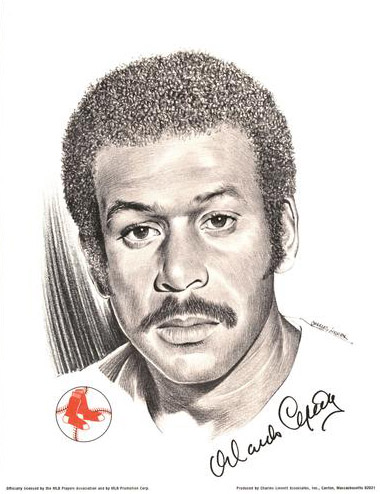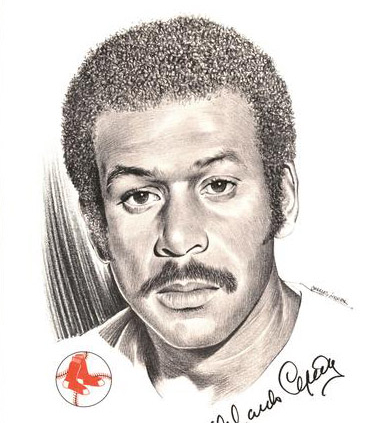August 12, 1973: Veteran DHs Orlando Cepeda, Frank Robinson rake in temperamental Fenway slugfest
 This dog day afternoon at Fenway Park was “a strange and sticky day for the 20,522 who chose to watch” in person.1 Boston Globe writer Peter Gammons put it aptly: “As often happens to very mediocre pitchers on hot Sunday afternoons in Friendly Fenway, they got combed all over the place.”2 Gammons referred specifically to the visiting California Angels’ bullpen, but no pitcher distinguished himself in that afternoon’s game between the Angels and Boston Red Sox.
This dog day afternoon at Fenway Park was “a strange and sticky day for the 20,522 who chose to watch” in person.1 Boston Globe writer Peter Gammons put it aptly: “As often happens to very mediocre pitchers on hot Sunday afternoons in Friendly Fenway, they got combed all over the place.”2 Gammons referred specifically to the visiting California Angels’ bullpen, but no pitcher distinguished himself in that afternoon’s game between the Angels and Boston Red Sox.
The Boston Herald American’s Joe Giuliotti wrote, “Baseballs flew around and out of Fenway Park all afternoon in a game in which tempers were as high at the end as the total of base hits (32).”3 The benches emptied twice in the late innings in response to brushback pitches.
But another Boston scribe, Harold Kaese, focused on the day’s happier story: the batting of 35-year-old Red Sox designated hitter Orlando Cepeda.4 Cepeda and the opposing DH, California’s 37-year-old Frank Robinson – both future Hall of Famers – each enjoyed a late-career highlight.
- This was the last of Cepeda’s five five-hit games in the majors. Along with a homer and double, two of his three singles were “shots off the [left-field] wall that would have been extra bases anywhere else.”5 He scored four of Boston’s 14 runs.
- Robinson recorded the 51st of his 53 career multi-homer games. He tied Harmon Killebrew for fourth at that time in home runs in major-league history, behind only Babe Ruth, Henry Aaron, and Willie Mays.
Cepeda’s 1973 season was an ongoing demonstration that he wasn’t washed up, despite bad knees. He’d appeared in just 71 games in 1971 and 31 in 1972, the last on July 7. The Oakland A’s released him in December 1972.
As the Puerto Rican slugger noted after his big game against the Angels, over the preceding winter “people didn’t even remember my name.” His seven-year-old son, Orlando Jr., had bought a baseball magazine with 1973 season previews. “The magazine was supposed to be about all the people in the major leagues and my name wasn’t even in it,” Cepeda recalled, adding, “I knew that some way or other I’d get back into baseball.”6
The opportunity arose as the American League approved the designated hitter rule in January 1973. Several days later, Boston signed Cepeda, who won the club’s DH job in spring training and held it after a slow start.
As play began on August 12, the home team was in fourth place in the tightly bunched AL East. The Red Sox sought to win the rubber match of the weekend series against the Angels, who occupied fifth place in the AL West, well behind the fourth-place Kansas City Royals, who’d taken two of three from Boston in the prior series.
On paper, the matchup favored California. Angels starter Bill Singer – en route to the second 20-win season of his sometimes brilliant but injury-plagued career – entered with a record of 15-9 and a 3.04 ERA, but he’d lost four straight starts.
Boston countered with rookie Dick Pole, making just his third big-league appearance after being called up at the beginning of the month. Pole had been roughed up in his prior two starts, not making it out of the fourth inning in either and yielding 10 earned runs in seven innings.
Yet Pole did enough to get his first big-league win. He pitched 5⅔ innings – the first five scoreless – and allowed three runs. Meanwhile, Boston scored three in the second inning, starting with Cepeda’s leadoff double.
The Red Sox added four in the fifth, taking a 7-0 lead that was never seriously challenged. The big blow was Danny Cater’s three-run homer, after which Angels manager Bobby Winkles pulled Singer for Rich Hand. Cater was subbing at third base for Rico Petrocelli, who was out with a sore elbow.7 Batting behind cleanup hitter Cepeda, the veteran corner infielder was 4-for-5 with four runs scored and four RBIs.
Hand was greeted with a homer by Boston catcher Carlton Fisk, but after that he retired the side while allowing just a walk.
California got on the board with three in the sixth, all coming on Robinson’s first homer of the day. One out later, Mike Epstein doubled; that was all for Pole. Rookie reliever Craig Skok ended the inning on Vada Pinson’s groundout.
Boston’s onslaught continued with five runs in the bottom of the sixth. Hand got the first batter, but three straight singles and an error followed. With one run in and the bases loaded, Steve Barber replaced Hand. The lefty gave up a walk and two singles, though Doug Griffin was caught running the bases. The Angels then brought in their third pitcher of the inning, Dave Sells, who allowed a single but no further runs. The Red Sox had sent 10 men to the plate and made it a 12-3 game. Shortstop Mario Guerrero, the only Boston starter to go hitless, made the first and last outs.
The Angels reached Skok for two in the top of the seventh. Pinch-hitter Leroy Stanton drove in both runs with a single. In their half of the inning, the Red Sox got their last two tallies of the day, pushing the lead to 14-5. The first was a “majestic” solo homer by Cepeda, the 376th of his career. It traveled “some 12 rows deep into the empty sector of the centerfield bleachers.”8
California chased Skok in the top of the eighth. Robinson’s leadoff double was followed by two walks and a single. With the bases loaded and nobody out, Boston skipper Eddie Kasko brought in Bobby Bolin, who escaped the jam by retiring three straight. Only one of the inherited runners scored.
In the home half of the eighth, tempers flared. Sells threw a pitch behind Tommy Harper that hit Harper’s bat. The Boston left fielder “started yelling at the pitcher and pointing to the plate while pounding it with his bat.”9 Sells’ next pitch went behind Harper’s ear. That drew a warning and an automatic $50 fine. “The two dugouts went to their top step and yelled nasties,” reported the Boston Globe.10
While home-plate umpire Don Denkinger walked to the mound to warn Sells, Fisk “came out of the Boston dugout and made intimidating gestures” toward the pitcher, the Los Angeles Times observed.11 “What business did he have sticking his nose into something that was strictly between Sells and Harper?” Robinson said after the game.12
The speedy Harper then beat out an infield hit. He later said, “I haven’t been so mad in a long time.”13 On the second pitch to Guerrero, he broke for second and went all the way to third base as Guerrero grounded out. Angels catcher John Stephenson had gone to third as well and his mask lay at Harper’s feet. Still angry, Harper kicked the mask, which prompted the benches to empty for the first time. Even Petrocelli, wearing a sweatsuit and sandals, joined the crowd,14 but no blows were thrown.
In the ninth, after retiring the first two batters on groundouts, Bolin brushed Robinson back – twice. Robby started jawing with Fisk. “I told Fisk to tell his pitcher to throw the ball over the plate,” Robinson later said. “I don’t know whether Bolin was intentionally throwing at me, but he does have that history and reputation. But that Fisk … maybe he called for those pitches.”15
The benches emptied again, “with Luis Tiant leading the charge from the Boston dugout,” according to the Springfield Union. Tiant shoved on-deck hitter Bob Oliver.16 Oliver charged at Fisk; it took five men to hold him back. After the game, Oliver said, “That Fisk is bush. He talks and talks. He umpires on every pitch, crying. He’s a busher and he’s gonna get it. I’ll be waiting for him in California.”17
Other Angels chimed in. Winkles called the catcher “a brash bastard.” Tom McCraw said, “Mark it down and count on it. That man is going to get smoked before the year is over.” Robinson said, “He’s brave only when other people are around.” Fisk had no comment.18
Once things settled down, Robinson hit his second home run of the game and the 544th of his career – it “soared over the left field nets.19 That was the last run scored in the slugfest, as Bolin recorded the final out without further ado. He qualified for his sixth save of the season under the less stringent definition then in effect.20
Cepeda smiled with deep satisfaction in issuing postgame remarks. “They kicked me when I was down. They stepped all over me. This is the happiest season of my career … because I’m showing all those people … that I’m back.”21
Author’s note
This game took place on my younger brother’s seventh birthday. We were in the stands with our parents, having traveled from Connecticut to celebrate the occasion. My clearest memory: beered-up but jovial Fenway fans telling Eric when to wave his pennant.
Acknowledgments
Thanks to Bill Nowlin and Paul Proia for providing an array of press articles. This article was fact-checked by Bruce Slutsky and copy-edited by Len Levin.
Sources
In addition to the sources listed in the Notes, the author consulted Baseball-Reference.com and Retrosheet.org for pertinent information, including the box score and play-by-play:
https://www.retrosheet.org/boxesetc/1973/B08120BOS1973.htm
https://www.baseball-reference.com/boxes/BOS/BOS197308120.shtml
Photo credit: Orlando Cepeda, Trading Card Database.
Notes
1 Jim Cohen, “Sox Win in Fenway Circus,” Springfield (Massachusetts) Union, August 13, 1973: 7.
2 Peter Gammons, “Sox Trounce Angels, 14-8 – No Classic,” Boston Globe, August 13, 1973: 21.
3 Joe Giuliotti, “Cepeda, Sox Outslug Angels, 14-8,” Boston Herald-American, August 13, 1973: 17.
4 Harold Kaese, “Cepeda’s Hits the Real Story,” Boston Globe, August 13, 1973: 22.
5 Tim Horgan, “Cepeda Faces New Role – at First Base,” Boston Herald-American, August 13, 1973: 17.
6 United Press International, “Cheers Sound Good to Boston’s Cepeda,” Lebanon (Pennsylvania) Daily News, August 13, 1973: 23.
7 Giuliotti.
8 Horgan.
9 Giuliotti.
10 Peter Gammons, “… and the Angels Sing of Fisk – but Not Praises,” Boston Globe, August 13, 1973: 22.
11 Ross Newhan, “Angels Talk Big, but Red Sox Win Argument, 14-8,” Los Angeles Times, August 13, 1973: 36.
12 Jim Dawson, “Fallen Angels Irate over Fisk’s Antics,” Riverside (California) Daily Press, August 13, 1973: C1.
13 George Bankert, “Harper Lost His Chance,” Quincy (Massachusetts) Patriot Ledger, August 13, 1973: 21.
14 Giuliottti.
15 Dawson.
16 Cohen.
17 Gammons, “… and the Angels Sing of Fisk.” The teams met again in Anaheim for a three-game set starting on August 24. In the opener, “there were no brushback pitches, harsh words, or other incidents.” See Jim Dawson, “Fisk Wrecks Angels, 3-2,” Riverside Daily Press, August 25, 1973: C1.
18 Newhan.
19 Giuliotti.
20 Joe Posnanski, “Save Evolves from Stat to Game-Changer,” MLB.com, April 11, 2017, https://www.mlb.com/news/how-save-rule-has-changed-baseball-c223677902.
21 Jim Cohen, “Cepeda Proves Point: He’s Back,” Springfield Union, August 13, 1973: 7.
Additional Stats
Boston Red Sox 14
California Angels 8
Fenway Park
Boston, MA
Box Score + PBP:
Corrections? Additions?
If you can help us improve this game story, contact us.


